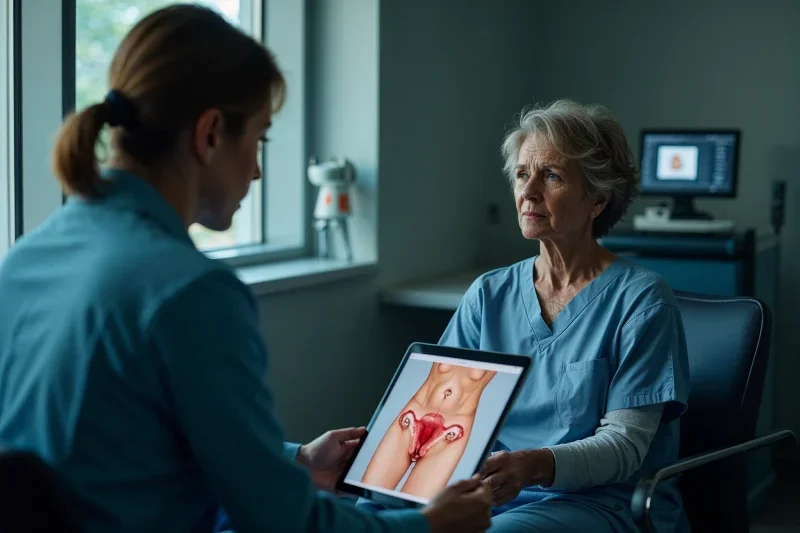The Heart and Mind: Psychological Motivations for Getting Tubes Untied
Categories:
By: Ethan Cole
Deep-seated desire for parenthood is a primary psychological motivation for reversing tubal ligation.
Regret after tubal ligation, often accompanied by feelings of loss and guilt, can prompt the desire for reversal.
Life changes such as new relationships, improved financial circumstances, or healing after loss can inspire the decision to reverse tubal ligation.
A positive mindset, hope, and optimism significantly influence the decision-making process for tubal ligation reversal.
Counseling and emotional preparation, both pre- and post-surgery, play a critical role in managing expectations and coping with emotions.
Introduction
The choice to reverse tubal ligation, commonly referred to as having one’s tubes untied, is often influenced by an intricate interplay of emotional and psychological factors. These may encompass an inherent yearning for parenthood, evolving family dynamics, or significant personal shifts.
In some instances, individuals might grapple with feelings of remorse following the initial procedure of tubal ligation. External societal pressures can also potentially contribute to this sense of regret. Moreover, life-changing events such as the commencement of new relationships, the achievement of financial stability, or the experience of loss may catalyze the desire for a reversal.
Crucially, emotions such as hope and optimism, coupled with an understanding of the anxiety surrounding this decision, play pivotal roles in this process. Enlisting the help of professional counseling services can be beneficial in providing emotional support, assisting in managing expectations and bolstering resilience in the face of potential challenges.
It is essential to adequately prepare oneself for the journey towards understanding the complex and multifaceted factors that influence desires for parenthood and personal fulfilment. As one continues on this path, further comprehension and clarity will undoubtedly ensue.
Introduction to Tubal Ligation Reversal
You might be wondering what tubal ligation is and why it’s a choice for some people. It’s a topic that’s been gaining attention, especially the growing interest in its reversal. Let’s start unpacking this, shall we?
What is Tubal Ligation and Why Do People Choose It?
An overwhelming number of women opt for tubal ligation, a surgical procedure that brings about permanent sterilization. You’re probably wondering what tubal ligation is, right? It’s a form of birth control where the fallopian tubes are either blocked, tied, or cut to prevent pregnancy. This procedure prevents eggs from traveling from the ovaries into the uterus, where fertilization usually occurs.
Now, why would you choose it? The reasons for getting tubes untied vary greatly. Some women choose tubal ligation for health reasons, others due to the number of children they already have, or because of financial constraints. Cultural influences on reproductive decisions also play a significant role. In some societies, large families are encouraged, while in others, smaller family sizes are preferred.
However, what if you’ve had a change of heart, or your circumstances have shifted? You’re not alone. Many women are exploring the possibility of getting their tubes untied. This doesn’t negate the purpose of your initial decision, but it’s a reflection of the fluid nature of life. Remember, it’s your body, your choice.
The Growing Interest in Tubal Ligation Reversal
Life changes, and so do the choices we make. One choice you may grapple with is tubal ligation reversal. Why? It’s largely due to the evolving psychological motivations for tubal reversal.
Perhaps you chose tubal ligation years ago, thinking you were done expanding your family. But life changes and tubal reversal decisions often come hand-in-hand. You may now long for the joy of cradling a newborn, or perhaps, your new partner dreams of having a child.
Family dynamics, in particular, play a significant role in tubal reversal choices. The desire to create a blended family or to replace the loss of a child can be poignant motivations. The longing to experience pregnancy again, or for the first time, can be a powerful emotional pull.
In essence, the growing interest in tubal ligation reversal is not a whim or a fad. It’s a response to deep, personal changes in life circumstances and family dynamics. It’s about answering a call from within, a call that insists: it’s time for a change. You’re not alone in this journey, and understanding the motivations behind your decision can be empowering.
Understanding the Emotional Dimensions of Reversal
You’re about to explore the emotional aspects of getting your tubes untied. We’ll discuss the profound desire for parenthood, the emotional and psychological impacts of regret after tubal ligation, and how societal and cultural pressures could influence your decision. It’s a complex journey, but understanding these dimensions can help you make an informed decision.
The Desire for Parenthood: A Deep-Seated Drive
Diving into the emotional dimensions of tubal reversal, you might find a powerful, deep-seated desire for parenthood driving the decision. This isn’t a whim, but rather an innate longing that can be overwhelming. It’s this drive that triggers the exploration of the emotional benefits of tubal reversal.
Imagine the joy, the renewed sense of fulfillment and purpose that comes with renewed parenthood after tubal ligation. The opportunity to experience the joys and challenges of raising another child can be a potent motivator. It’s not just about adding a child to your family—it’s about fulfilling a deep-seated desire, a need that goes beyond the physical.
However, this journey requires psychological preparation for tubal reversal. You need to understand what you’re getting into. The process can be emotionally draining, and there can be potential disappointments. But with the right mindset, you can navigate these challenges. The desire for parenthood, for giving life, is a formidable force. Harness it with courage and conviction, and the path to renewed parenthood can lead to profound personal growth and enriching experiences.
Regret After Tubal Ligation: Emotional and Psychological Impacts
Coming to grips with regret after tubal ligation can be a tough emotional ordeal. You’re not alone in this — many women experience similar feelings. The emotional impacts of tubal ligation can be far-reaching, affecting your self-esteem, mental health, and relationships.
You may feel a sense of loss or grief, mourning the potential children that could have been. It’s also common to experience guilt, feeling that you’ve let yourself or your partner down. These emotions can lead to stress, anxiety, and even depression, impacting your overall well-being.
But remember, it’s okay to feel this way. Your feelings are valid, and it’s important to acknowledge them rather than suppress them. Counseling for tubal ligation regret can be an invaluable resource, providing a safe space to express your feelings and navigate your emotions. A professional counselor can help you come to terms with your decision and find ways to cope with your regret.
While regret after tubal ligation is a challenging journey, know that it’s possible to find peace and acceptance. It may take time and patience, but with the right support, you can move forward.
Societal and Cultural Pressures Influencing Reversal Decisions
Steering through the societal and cultural pressures that can influence the decision to reverse a tubal ligation is another emotional dimension to contemplate. You may experience these pressures from various sources: family, friends, or your community. They might subtly or overtly suggest that you should expand your family, thereby magnifying your anxiety about tubal reversal surgery.
However, remember that the ultimate decision lies in your hands. This is where reproductive choice empowerment comes in. It’s about asserting your right to make decisions about your body and fertility. It’s about standing strong amidst external pressures and making a choice that aligns with your personal desires and circumstances.
Partner support in tubal ligation reversal can also play an essential role. A supportive partner can help you navigate the emotional turmoil associated with the decision, providing comfort and reassurance. They can help alleviate your fears and anxieties about the surgery and its outcome.
Life Events That Inspire the Decision to Reverse Tubal Ligation
You’ve experienced life changes that are nudging you towards reversing your tubal ligation. Perhaps you’re in a new relationship and have a shared desire to build a family, or there’s been a shift in your personal or financial circumstances. Alternatively, you may be seeking healing after a loss and see this as a step towards starting anew.
New Relationships and the Desire to Build a Family Together
Starting on a new relationship often stirs up fresh dreams and ambitions. You’re looking forward to a life filled with shared experiences and mutual growth. Perhaps, there’s a desire to build a family together, to share in the joy and challenge of raising children. If you’ve previously undergone a tubal ligation, however, this dream might seem unattainable.
But there’s hope. Tubal reversal isn’t just a physical procedure—it’s a journey towards emotional healing. The procedure can reignite the possibility of conceiving naturally, providing a path to fulfill your shared dreams.
After tubal reversal, you might experience a surge of hope, a renewed sense of possibility. This isn’t just about having a baby; it’s about building a life together, about experiencing parenthood as a team.
Emotional healing after tubal reversal is a profound process. It involves moving past fear or regret, embracing new possibilities, and investing in a shared future. It’s about knowing that your past decisions don’t have to limit your future happiness.
A Change in Personal or Financial Circumstances
Life can be unpredictable, and sometimes, changes in your personal or financial circumstances may lead you to reconsider previous decisions, like undergoing a tubal ligation. It’s not uncommon to reevaluate your choices when you’ve achieved financial stability or when your personal life shifts in a significant way.
For instance, you may have made the decision to have your tubes tied when you were in an unstable financial situation. Now, with a stable income and a secure future, you may feel you’re in a better position to afford the costs of raising a child. You’ve got the resources to provide for a child’s needs and secure their future, and this change in circumstances could inspire you to reverse your tubal ligation.
Or, perhaps, your personal life has undergone a transformation. You’ve found a new purpose or a renewed sense of self, and you feel ready to embrace motherhood again. You’ve grown, matured, and your life outlook has changed. This personal growth and transformation can be a strong motivator to reverse a previous decision and welcome the possibility of a new life. Whatever your reasons, it’s important to remember that it’s your journey and your choice.
Healing After Loss: Grieving and Starting Anew
Can you imagine the pain of losing a child? It’s an unimaginable experience, one that leaves a deep and lasting wound. Grieving is a natural, necessary process, but it’s also one of the hardest things you’ll ever do.
Yet, life has a way of surprising us. Amid the pain and sorrow, you might experience a new yearning: to be a parent again. This is not about replacing the child you lost, or forgetting them. Rather, it’s about opening your heart to love and nurture once more. It’s about finding a way to turn the page, to start anew.
Choosing to reverse tubal ligation in this situation is a deeply personal decision. It’s not an easy road, but it’s one that’s often guided by a powerful instinct to love and care for a child. You’re not alone in this journey. Many women have found strength and healing in making this choice. Remember, it’s not about forgetting the past, but about embracing the possibility of a future filled with love and life.
Call now to schedule an appointment with Dr. Jason Neef and explore your fertility options.
Psychological Factors Influencing Decision-Making
Let’s explore the psychological factors that can shape your decision to have your tubes untied. Consider how hope and optimism can impact your medical choices, and the role anxiety and uncertainty about the procedure play in your decision-making process. Don’t forget to factor in how you cope with societal judgment and misunderstandings about your choice.
The Impact of Hope and Optimism on Medical Choices
When facing medical decisions, your mindset plays a considerable role. Your outlook, particularly your levels of hope and optimism, can considerably impact your choices. If you’re laden with hope, or imbued with optimism, you might be more inclined to pursue procedures like tube unties. This isn’t a flippant decision, but rather a profound one, steeped in self-belief and forward-thinking.
It’s not only about wanting a child, but also about trusting in the possibility of a successful outcome. You’re not just betting on medicine, but on yourself. This is where hope and optimism intertwine neatly with your decision-making. They become the emotional fuel propelling you forward, overriding any self-doubt.
Balancing Anxiety and Uncertainty About the Procedure
In making a decision to get your tubes untied, it’s important to contemplate the less buoyant emotions, too. Anxiety and uncertainty are common, yet these feelings don’t have to deter you.
Anxiety can surface from fear of the unknown, potential pain, or even the possibility of regret. It’s normal to feel uneasy about surgery or worry about the outcome. Meanwhile, uncertainty might stem from concerns about the procedure’s success, or the emotional and physical changes that might follow.
Yet, it’s crucial to remember that there’s a distinction between anxiety and danger. Anxiety is a reaction to potential harm, not an indicator of actual risk. Similarly, uncertainty doesn’t mean you’re making a wrong choice. It’s simply the recognition that you can’t predict every outcome.
To balance these feelings, educate yourself about the procedure. Understand the risks and benefits, learn about recovery, and ask your doctor about any concerns. Being informed won’t erase all anxiety or uncertainty, but it will provide a solid foundation for making your decision.
Coping with Societal Judgment and Misunderstandings
Despite the personal nature of your decision to get your tubes untied, societal judgment and misunderstandings can cast a heavy shadow. You may find yourself on the receiving end of unsolicited opinions and criticism. It’s important to remember that you’re not alone in this situation. Many women have faced the same challenges and emerged stronger, more self-assured.
The key to coping lies in understanding your own motivations and standing firm in your decision. Recognizing that your decision doesn’t need validation from others, and that you’re in control of your own narrative, can provide immense relief. You’re empowered to decide what’s best for your body and your life.
Communication also plays an essential role. Be open about your feelings with supportive friends or family. They can provide you with a sounding board for your emotions, as well as a buffer against societal pressure. You might also consider seeking professional help, such as a counselor or therapist, who can equip you with effective strategies to deal with judgment and misunderstanding.
In the end, remember that your journey is yours alone and the opinions that truly matter are your own.
The Role of Family and Partner Support
You’re not alone in this journey, as your family and partner’s support can greatly influence your decision to get your tubes untied. It’s essential to navigate through their opinions and expectations, understanding their perspectives while asserting your own. Remember, building a strong support system before surgery is an important step towards a successful recovery.
How Partners Influence the Decision for Reversal
When considering a tubal ligation reversal, your partner’s input can play a pivotal role. This decision is not solely about you; it’s about your relationship too. Their emotional support, understanding, and shared vision of your future together can be the guiding light in your journey.
Your partner’s perspective on family expansion can greatly influence your decision. If they’re on board with having more children, you’re likely to feel reassured and encouraged. If they’re hesitant or opposed, it may lead you to reconsider. Remember, open, honest communication is key. Discuss your feelings, fears, and hopes extensively with your partner to guarantee you’re both on the same page.
Their financial support can also be a significant factor. Reversal procedures can be costly, and having your partner’s backing can ease the financial strain. Furthermore, their emotional support during the recovery process is invaluable. They can provide comfort, help manage your expectations, and assist in your physical recovery.
Navigating Family Opinions and Expectations
Maneuvering through the maze of family opinions and expectations can feel like an intimidating task, particularly when considering a decision as significant as getting tubes untied. You’re not alone in this. It’s common to feel pressure from various family members, each with their unique perspective and concerns.
Remember, this is your decision, and it’s essential to manage these influences effectively. Start by opening clear lines of communication with your family. Explain your motivations honestly, addressing their concerns directly. It’s not about winning an argument, but about sharing your feelings and desires, fostering mutual understanding.
Misunderstandings can often stem from misconceptions about the procedure and its implications. Educating your family about tube reversal may dispel some of their fears. Equip yourself with accurate information from trusted sources to address misconceptions and provide reassurance.
Finally, be patient. Changing ingrained ideas doesn’t happen overnight. Respect their feelings even if they don’t align with yours. They’re likely coming from a place of love and concern.
Navigating family opinions and expectations is challenging, but with persistence and empathy, you can pave the way for a supportive environment, vital for your emotional wellbeing during this significant decision-making process.
Building a Strong Support System Before Surgery
Building a robust support system before surgery can play an instrumental role in your journey towards getting your tubes untied. It’s not just about having someone there for physical support when you’re recuperating post-surgery. It’s about ensuring emotional and psychological support as well, essential factors that often get overlooked.
Your family and partner’s support can greatly ease the strain of this life-changing decision. They can provide comfort, reassurance, and practical help when you most need it. But remember, support isn’t about them making decisions for you. It’s about respecting your choices and standing by you, even when things get tough.
Don’t shy away from telling them what you need. Open communication is key. If you need them to simply listen without offering advice, tell them. If you need help with practical things like doctor’s visits or taking care of other responsibilities, ask for it.
Building a strong support system isn’t a sign of weakness; rather, it’s a step towards ensuring a smoother journey. So reach out, communicate your needs, and allow the people who care about you to be there for you during this important phase of your life.
The Long-Term Psychological Benefits of Reversal
Now, let’s talk about the long-term psychological benefits that can come with reversing a tubal ligation. You may find renewed confidence and emotional fulfillment, along with strengthened relationships and family bonds. Also, you’ll likely appreciate regaining control over your reproductive choices.
Renewed Confidence and Emotional Fulfillment
Your journey to renewed confidence and emotional fulfillment begins with the decision to have your tubes untied. This is not a step taken lightly, but one that is rooted in your longing for a redefined sense of self and purpose. It’s a transformative journey, one that will reshape your psychological landscape and rekindle your zest for life.
You’ll be instilled with a newfound sense of control after the procedure. Having the ability to make decisions about your body, fertility, and future can be a powerful catalyst for self-assurance. It’s not just about regaining a physiological function; it’s about reclaiming your autonomy. This can bolster your self-esteem, giving you a renewed sense of confidence in your body and your decisions.
Additionally, the emotional fulfillment derived from this decision can’t be overstated. The possibility of expanding your family can bring immense joy, but even beyond that, the process can stir a profound sense of meaning and purpose within you. You’ll find yourself not just reconnecting with your desires, but also redefining your identity.
Strengthened Relationships and Family Bonds
Having your tubes untied does more than just ignite personal transformation; it can also lead to stronger relationships and deeper family bonds. This procedure, medically known as tubal ligation reversal, can open up opportunities for you to connect on a new level with your partner and other family members.
Firstly, your decision to have this procedure signifies a shared commitment with your partner to expand your family. It’s a proof of your collective resilience and willingness to tackle life’s challenges together. This shared journey can strengthen your bond, fostering a deeper understanding and mutual respect between you.
Secondly, the possibility of a new family member can ignite a unique sense of anticipation and excitement. It’s a chance for you to create shared memories and traditions, instilling a sense of unity and connection.
Reclaiming Control Over Reproductive Choices
Deciding to get your tubes untied can feel like reclaiming control over your reproductive choices. This decision can provide an empowering sense of agency and autonomy, allowing you to direct your future in a way that aligns with your evolving desires and life circumstances.
A tubal reversal doesn’t just restore your physical ability to conceive—it can also impart long-term psychological benefits. You’re no longer at the mercy of a decision made in the past, one that might not reflect your current wishes. Instead, you’re taking an active role in shaping your life, a move that can greatly boost your psychological well-being.
Moreover, the decision to untie your tubes can reinforce your sense of self-determination. It’s a powerful affirmation of your right to make choices about your body and your future. This can lead to heightened self-confidence, improved self-esteem, and a greater sense of personal fulfillment.
The Role of Counseling and Emotional Preparation
As you consider tube reversal, it’s important to understand the role of counseling and emotional preparation. Pre-surgery, you’ll face expectations and fears that need to be addressed, and post-reversal, emotional adjustments may be challenging. You’ll find resources to support your emotional well-being throughout this journey, playing a vital role in your overall experience.
Pre-Surgical Counseling: Addressing Expectations and Fears
Undergoing a procedure to have your tubes untied can stir up a mix of emotions, from anticipation to anxiety. It’s essential to recognize that these feelings are entirely normal. However, they can be managed effectively with the right counseling and preparation.
Pre-surgical counseling provides a supportive platform where you can freely express your hopes, doubts, and fears. Skilled counselors are adept at helping you navigate these emotional complexities. They’ll guide you towards understanding the procedure, its potential outcomes, and the probable impact on your life.
At this stage, you might be grappling with questions like ‘What if the surgery isn’t successful?’ or ‘What if I regret my decision later?’ These are valid concerns, and a counselor can help you address them. They’ll assist you in setting realistic expectations, thereby reducing any unwarranted stress or anxiety.
Post-Reversal Support: Navigating Emotional Adjustments
Once your tubes are untied, the emotional journey isn’t over. You might feel a whirlwind of emotions as you adjust to your new reality. Don’t worry, you’re not alone in this. It’s common to experience a range of feelings post-reversal, from relief and joy to uncertainty or anxiety.
One essential part of maneuvering these emotional adjustments is counseling. It serves as a safe haven for you to express your feelings openly and constructively. A skilled counselor can help you process your emotions, offer insights, and equip you with coping strategies to handle potential stressors. Preparing emotionally for this change isn’t just about managing your expectations; it’s about building resilience and emotional strength.
Remember, it’s okay to lean on others during this time. Engage in open conversations with your partner, family, and friends. Their support can provide a source of comfort and understanding.
In the end, understanding and accepting your emotions are vital steps in your post-reversal journey. With the right support and preparation, you’ll be better equipped to navigate the emotional terrain that lies ahead. Embrace the process, and remember, you’re stronger than you think.
Resources for Emotional Well-Being During the Journey
Steering the journey of getting your tubes untied can be emotionally challenging. It’s a significant decision and you need to be prepared, both physically and mentally. But don’t worry, you’re not alone. There are resources available to help you navigate this journey.
Professional counseling can be a lifeline during this time. Trained counselors can provide you with the emotional tools needed to cope with any anxiety or stress you may be feeling. They can offer strategies for managing your emotions and maintaining your mental health. It’s not a sign of weakness to seek help, but a step towards mastery of your own well-being.
In addition to counseling, you may find comfort and reassurance in support groups. Speaking with others who are going through the same process can provide a sense of community and understanding. Sharing your fears and successes with others can be incredibly therapeutic.
Conclusion
Reflecting on the journey, it’s evident that the psychological motivations for getting tubes untied are multifaceted. You’ve seen that personal growth, the desire for more children, and an evolving perspective on family life all play a role. It’s not a decision made lightly, nor is it one made in isolation.
Your emotions are at the forefront of this process, and it’s essential to understand them for your mental and emotional well-being. You’ve learned that the desire to expand your family or experience motherhood again can be powerful motivators. It’s also clear that the regret of having the procedure in the first place can prompt the decision to reverse it.
It’s also clear that the regret of having the procedure in the first place can prompt the decision to reverse it. At Dr. Jason Neef’s practice, we are here to support you through this deeply personal journey, providing compassionate care and expertise to help you achieve your family goals.
Make an appointment with Dr. Jason Neef today to discuss your path to parenthood.
Call (817) 568-8731Categories:
Frequently Asked Questions
-
Tubal sterilization is a sterilization procedure that blocks or removes the fallopian tubes to block the passage of eggs, preventing them from being fertilized by sperm. It is often chosen by women who no longer wish to become pregnant and is considered a permanent method of contraception.
-
Yes, in many cases, tubal ligation surgery can be reversed through a procedure called tubal reanastomosis, allowing women to become pregnant naturally. However, success rates depend on factors like the age at the time of the reversal and the presence of scar tissue.
-
Essure reversal is a non-surgical implant that permanently blocks the fallopian tubes, while laparoscopic tubal ligation involves making small cuts near the belly button to place clips or bands that block your tubes. Both methods are used for female sterilization.
-
Women who become pregnant after a tubal ligation surgery or pregnant after tubal reversal have an increased risk of ectopic pregnancy, where the fertilized egg implants outside the womb, usually in the fallopian tubes, posing serious health risks.
-
For women who cannot undergo a successful reversal, IVF bypasses the fallopian tubes, fertilizing the egg in a lab and implanting it directly into the womb. This method has high success rates and avoids complications like scar tissue.
-
Women may regret getting their tubes tied due to changes in their life circumstances, such as wanting more children or experiencing emotional distress. This regret is common in younger women or those who made the decision under the age of 30.
-
A laparoscopic tubal ligation involves making small cuts near the belly button to insert a laparoscope, which allows the surgeon to see inside the abdomen and block your tubes using clips, rings, or cauterization.
-
In many cases, tubal ligation surgery and reversible contraception procedures are covered by insurance, especially when they are deemed medically necessary or part of a long-term family planning strategy.
-
Complications such as pelvic inflammatory disease, scar tissue, or chronic pain can occur following tubal ligation. Prompt medical evaluation and treatment, such as laparoscopy, are critical to addressing these issues effectively.
-
General anesthesia ensures that women undergoing laparoscopic tubal ligation are comfortable and pain-free during the procedure. It is administered in most cases since the surgery involves accessing the pelvic cavity through small cuts.











